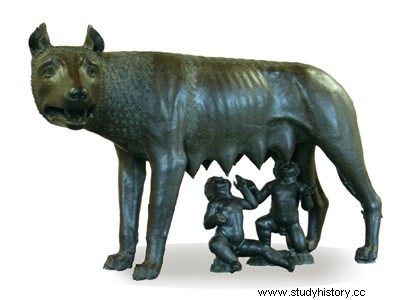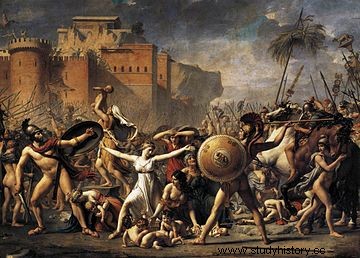 Livy is a rare bird in the world of Latin historiography. Unlike what happens with other great Roman historians such as Tacitus, Cato or Sallust, Tito Livio did not hold any public office nor did he have an active role in Roman political life, but instead dedicated his entire life to completing the titanic task of narrating the history of Rome from its foundation to the end of the Republic.
Livy is a rare bird in the world of Latin historiography. Unlike what happens with other great Roman historians such as Tacitus, Cato or Sallust, Tito Livio did not hold any public office nor did he have an active role in Roman political life, but instead dedicated his entire life to completing the titanic task of narrating the history of Rome from its foundation to the end of the Republic.
Beyond his work we hardly have any information about his life. We know that his birth took place in the year 64 B.C. thanks to Saint Jerome, who makes it coincide with that of V. Mesalia. He agreed that it is documented (Saint Jerome makes an error in considering that both were born in the year 59 BC). He was born in Padua, in those years the most important city in the northwest of the Italian peninsula and, according to the census of the year 19 AD, the second most populous city in the Empire.
Livy belonged to a wealthy bourgeois family but not to the Roman aristocracy. We presume that he had a solid education and, from what can be deduced from his work, with clear Hellenic influences. Little is known about his youth and adulthood, and opinions on the matter are divided:there are those who consider that he remained practically his entire life in Padua and those who believe, on the contrary, that he moved to Rome when he reached maturity. In any case, we know that from the year 27 B.C. he devoted himself exclusively to writing, which implies that he must have acquired a certain reputation and that he was well connected with the imperial court. Along with his historical work, it seems that he also devoted himself to oratory, philosophy and literary criticism, although we do not know if he wrote anything about them. He died in his hometown in AD 17. at 81 years of age, well above the average life expectancy at the time.
Livy has gone down in history for his monumental “History of Rome since its foundation ”, whose original title seems to be Ab urbe condita libri . Composed of 142 books (of which thirty-five and some loose fragments of others have come down to us), it traces the history of Rome from its foundation to the year 9 AD. We do not know if he wanted to stop this year for a specific reason or if his death prevented him from completing the rest. We know the content of the lost books, poorly and with gaps, through summaries called periochae written by an anonymous author.
 One of the biggest controversies surrounding the work of Tito Livio is related to its structure and systematics. The division that the author applied to his books is not clear and some of them have reached us distributed over decades. However, it seems that this distribution is later and it is more likely that, if groupings were established, they were made in pentads (groups of five books). The differences in length of some books with respect to others do not facilitate the solution of the controversy either.
One of the biggest controversies surrounding the work of Tito Livio is related to its structure and systematics. The division that the author applied to his books is not clear and some of them have reached us distributed over decades. However, it seems that this distribution is later and it is more likely that, if groupings were established, they were made in pentads (groups of five books). The differences in length of some books with respect to others do not facilitate the solution of the controversy either.
Since Tito Livio did not actively participate in the politics of the time and there is hardly any information about his life, his scholars have extracted the traits of his character through his work and the prevailing atmosphere in his hometown. From one and the other they deduce that he must have been an austere, cold, distant, somewhat arrogant person with very traditional moral principles, in force in Padua, which at that time was the center of Roman conservatism.
Tito Livio does not write for the mere pleasure of narrating events, nor for the desire to deepen the investigation of events. The purpose of it is to extol the traditional values of Rome to correct the defects of the society in which he lives, that is, it has a didactic and moralizing objective. Tito Livio considers that the virtus Rome has been degraded until reaching the decadent point of the moment in which he writes, as a result of the abandonment of the customs and traditions that made Rome great. To reverse this situation, he uses the past as an example of the behaviors and values that should govern the Empire and that allow its moral regeneration.
In this context, the facts and historiographic precision are placed in the background, as the historian himself acknowledges. The first books, in which he collects the legends about the foundation of Rome, give a good account of the lack of rigor, since in them he prioritizes the fantastic and the legendary over the real and historical. This circumstance does not worry Tito Livio excessively either, since his objective is another and precision is displaced in favor of the exemplary content transmitted by the legends.
 Tito Livio's objective is best perceived in the prefaces that he writes at the beginning of some of the books of him (as was customary in ancient historiography). In them he exposes the principles that govern his work, of which the most relevant is the one already mentioned, the conception of the present as a refuge from the past and its exemplary influence. Also highlighted within his historiographical concept is the critical neutrality against the non-historicity of the legendary tradition (he recognizes that his initial stories are fantastic and lack a historical purpose, although they have a didactic purpose), the ethical principle of the causality of the facts (with prominent role of religion) and the relevance of the instructive value of knowledge of the past.
Tito Livio's objective is best perceived in the prefaces that he writes at the beginning of some of the books of him (as was customary in ancient historiography). In them he exposes the principles that govern his work, of which the most relevant is the one already mentioned, the conception of the present as a refuge from the past and its exemplary influence. Also highlighted within his historiographical concept is the critical neutrality against the non-historicity of the legendary tradition (he recognizes that his initial stories are fantastic and lack a historical purpose, although they have a didactic purpose), the ethical principle of the causality of the facts (with prominent role of religion) and the relevance of the instructive value of knowledge of the past.
Unlike Tacitus and Sallust, Titus Livy is not going to deal only with specific episodes that occurred in the nearest years or decades, but rather goes back several centuries, following the Hellenic tradition . As this approach prevents him from going to direct testimonies or official documents (at least for the first centuries of his work), he has to use as sources the works of authors who have already written about what he himself deals with. Even when he has the opportunity to consult official documents, he prefers to continue relying on the work of his predecessors.
His treatment of the facts has led some authors to deny Titus Livy the status of true historian. The criticisms leveled at his work are quite harsh. He is accused of not applying a critical bias to the sources (especially in the first books, although he is already aware of this) and of including incorrect data, especially chronological and geographical. He is also blamed for a serious ignorance of the functioning of Roman political institutions, the economic context and the treatment of diplomatic issues as a result of his lack of political activity, for which he idealizes wars and the political system. His desire to extol past glories leads him to omit facts, such as massacres or military failures, that could cloud the image of the ethos Roman that he intends to convey. Lastly, he is accused of lacking an awareness of historical change, considering that principles and values serve both a small city and a great empire.
